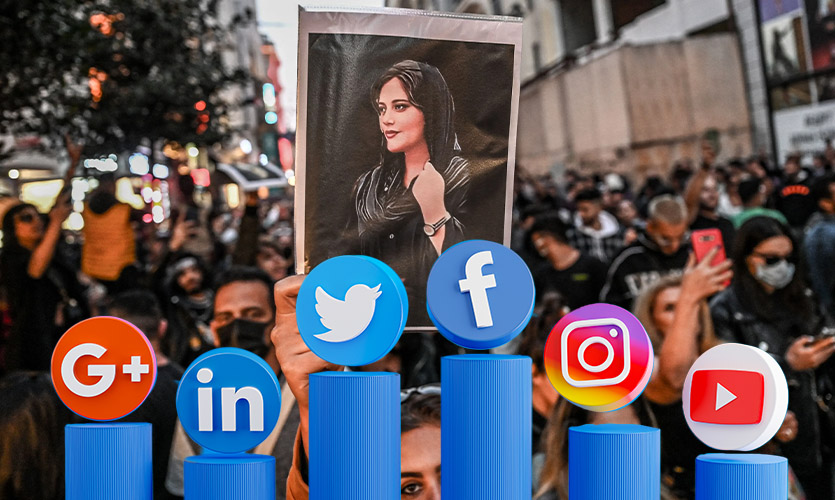As the protests over the death of 22-year-old Mahsa Amini in Iran intensify, women, politicians and celebrities on social media continue to create videos in their support, speaking against the injustice faced by the young girl.
Amini was allegedly arrested for wearing her headscarf too loosely, after which, she was kept in custody for three days until her death on September 16, leaving women in the country distraught and several burning questions surfacing against the Iranian authorities. The protests that began in Iran faced brutal crackdown from the government who deployed riot police, leading to numerous arrests. As of October 12, according to a report by an Iranian rights group, the country has seen at least 201 deaths. Iran’s authorities have tried to cover up the cause for Amini’s death by saying that she died of a heart failure, however, her family and protesters directly accuse the government of killing her. Iran has also termed the protests as a conspiracy launched by the US and Israel.
The protests have spread across the globe like wildfire, leading to social media users starting vast online movements in order to get justice for Amini and the women of Iran.
In a viral video on Instagram, Iranian actor Elnaaz Norouzi joined the protest against Iran’s morality police by stripping from the burqa to bikini, in front of the camera. As numerous comments on social media shamed her, the support from people, especially women from all around the globe, exposed the rage and fear felt by them daily.
Taking to Twitter with #IranProtests22, 40 German actors compiled a video of them chopping their hair in order to spread awareness about the injustice, and show support to the women in Iran who are fighting for their rights.
In a conversation with TIME magazine, Mahmood Amiry-Moghaddam, director of the NGO Iran Human Rights, said, “What you see is people who are fed up with a regime. Not only do they take away people’s civil and political rights, but they also interfere in people’s most private aspects of life, like what you wear.”
Amiry-Moghaddam said that it is difficult to estimate the number of people protesting but it is definitely in the thousands. “There are people from different backgrounds protesting for their fundamental rights. I have never seen so much anger before,” he added.
On International Day of the Girl, former US president Barack Obama and former first lady Michelle Obama released a statement supporting the courageous women and girls of Iran who are protesting to seek their rights of equality and independence.
“The rights they seek are universal: equality, the ability to make their own choices about how they look and dress and express their identities, and the freedom to do so without facing harassment, intimidation and violence,” said Obama in the press statement.
Acknowledging the difficult days that the protests will bring along with itself, he talked about how such young relentless women are a constant reminder of how “true power comes not from clinging to the past, but from the efforts to build a better future.”
Women have been in a war for justice, freedom and equality since centuries. Multiple protests around the globe, where a large number of people with banners and pictures of Amini injured and lying on the hospital bed, can be seen. “Woman, Life and Liberty” and “I will kill who killed my sister” are slogans that echo across these demonstrations. As cross-sectional protests have ignited, uniting people from all ethnicities and class lines in order to obtain universal liberation, pain and sorrow can be heard in the cries of the protesters, fighting to free our world from the tyranny of oppression.
Following the 2009 Green Movement, women’s rights activist Fatimah Baraghani wrote poems about a new dawn for women’s independence and the country of Iran. One such poem ends with the lines:
“You may wish to have me burned, or decide to stone me.
But in your hand match or stone will lose their power to harm me.”
The Iranian women’s fight for their rights has been long and bloody, and this seems to be the breaking point of people globally as numerous TikTok videos and Instagram reels showcase women and men of all colours and nationalities taking an active part in supporting the protests.
Actor Nazanin Boniadi has taken to her Twitter account to support the raging protests, by putting up videos about how her international community can support the Iranian women. She is constantly updating her followers about the protests in Iran, along with names of people actively participating and being injured by the official Iranian authorities.
Iranian Education Minister Yousef Nuri spoke to the Shargh daily about how several pupils have been arrested and held in “psychological centres” with the motive of “reforming and educating” them to ensure that they don’t actively participate in the protests and turn into “antisocial characters”. The internet has not been kind to her since and has been calling out to the UN to take actions against such problematic actions.
Activists and lawyers on ground have also made sure to disseminate evidence of police brutalities, including indiscriminate shooting, all over social media.










